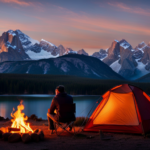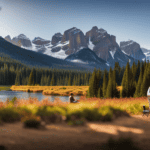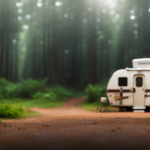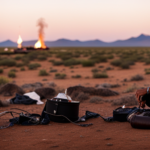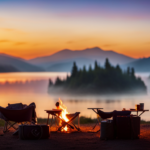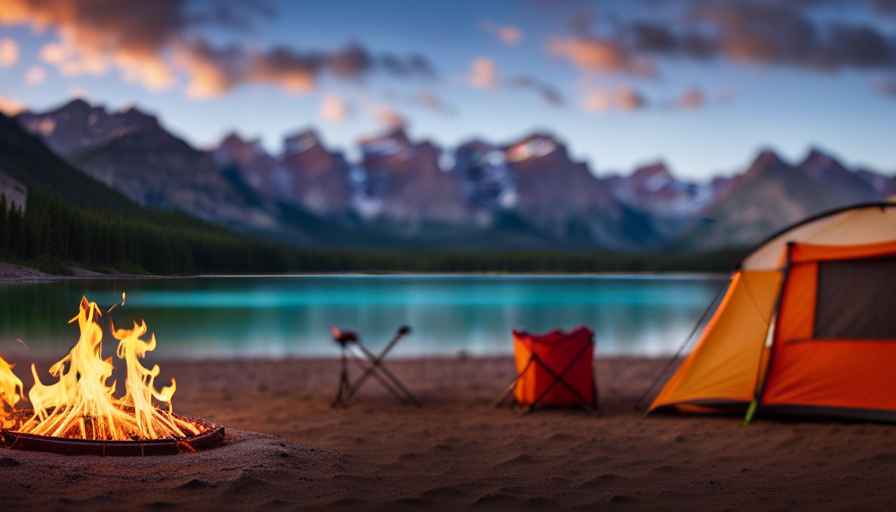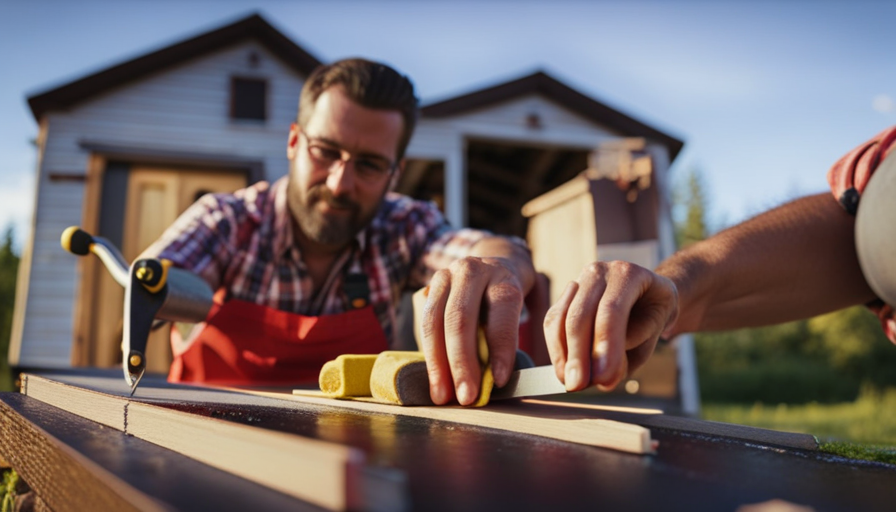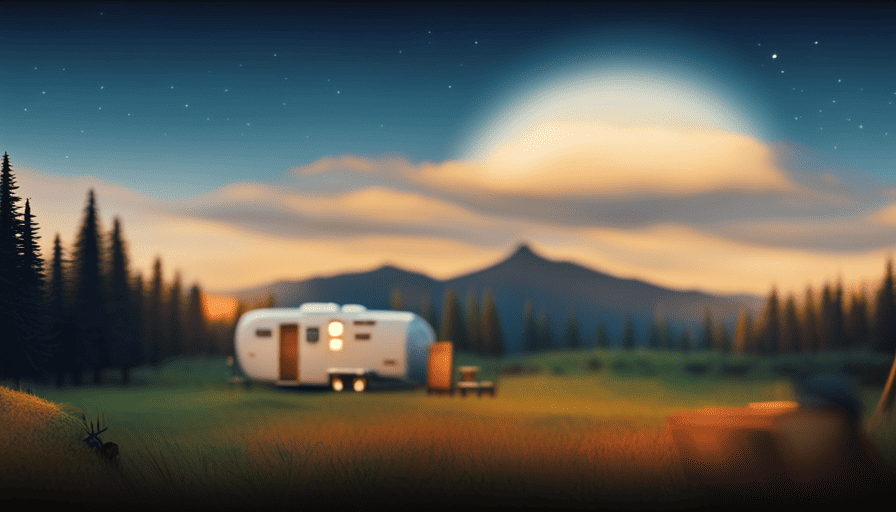Imagine beginning each day with the songs of birds, the fresh smell of air, and the freedom to go wherever your heart desires. Choosing a camper as your permanent residence provides the opportunity to experience this sense of freedom and adventure every single day.
Did you know that over 1 million people in the United States have chosen to make a camper their permanent home? It’s a lifestyle that offers flexibility, simplicity, and a unique connection to nature.
In this article, I will share my personal experience and provide you with practical tips on how to live in a camper full time. From choosing the right camper to managing your finances, staying connected on the road, and finding community, I will guide you through every step of this exciting journey.
So, if you’re ready to embrace a life of exploration and spontaneity, let’s dive in and discover the joys of full-time camper living.
Key Takeaways
- Choosing the right camper based on budget, lifestyle, and travel preferences is crucial for a successful full-time camper living.
- Establishing reliable income sources and ensuring a stable internet connection are essential for sustaining a nomadic lifestyle.
- Optimizing storage, embracing a minimalist lifestyle, and focusing on multi-purpose items are key to setting up a comfortable living space in a camper.
- Prioritizing travel safety, being prepared for emergencies, and staying updated on weather conditions are important aspects of living in a camper full time.
Choosing the Right Camper
So, you’re ready to hit the road and live in a camper full time – but how do you choose the right one for your epic adventure?
There are several camper types to consider, each with their own pros and cons.
The first option is a motorhome, which offers the convenience of driving and living in the same vehicle. They come in various sizes, from compact vans to spacious Class A motorhomes. The main advantage is the ease of mobility, allowing you to explore different locations without needing to tow anything. However, they tend to be more expensive and less fuel-efficient than other options.
Another option is a towable camper, such as a travel trailer or fifth wheel. These campers are towed behind a vehicle, which gives you the flexibility to leave your home set up while you explore the surrounding areas. They also tend to be more affordable and offer a wider range of floor plans and amenities. However, you will need a suitable towing vehicle and may face challenges maneuvering in tight spaces.
When choosing the right camper, consider your budget, lifestyle, and travel preferences. Think about the size, layout, and features that will best suit your needs. Once you have the perfect camper, you can start planning your route and embark on your incredible journey.
Now, let’s dive into the next step: planning your route.
Planning Your Route
Traveling in a camper allows me to embark on exciting adventures and map out my route accordingly. Planning my route is a crucial step in ensuring a successful full-time camper lifestyle. Here are some tips to help you plan your route effectively:
-
Research camping spots: Before hitting the road, it’s important to research and identify camping spots along your route. Look for campgrounds, RV parks, and boondocking opportunities that suit your preferences and budget.
-
Consider amenities: When choosing camping spots, consider the amenities they offer. Some campgrounds have full hookups for electricity, water, and sewer, while others may offer more rustic settings. Think about what amenities are important to you, such as laundry facilities, showers, or Wi-Fi.
-
Prepare meals: Living in a camper means you’ll be responsible for preparing your meals. Plan your route in a way that allows you to access grocery stores or local markets for fresh ingredients. Consider meal planning and stocking up on non-perishable items for longer stretches on the road.
By planning your route and considering factors like camping spots and meal preparation, you can make the most of your full-time camper lifestyle.
Once you have your route mapped out, it’s time to think about managing your finances and ensuring a sustainable lifestyle on the road.
Managing Your Finances
Managing your finances while living a nomadic lifestyle can be a challenging yet rewarding endeavor. One of the most important aspects of living in a camper full time is creating and sticking to a budget. This will help you keep track of your expenses and ensure that you are living within your means.
Some budgeting tips that I’ve found helpful include setting aside a specific amount for gas, groceries, and campground fees each month. It’s also important to save for unexpected expenses, such as vehicle repairs or medical emergencies.
Another key component of managing your finances is finding reliable income sources. Many full-time campers work remotely, taking advantage of the freedom that comes with living on the road. This could include freelance work, remote jobs, or starting your own online business. It’s important to have a steady stream of income to cover your expenses and save for the future.
Managing your finances while living in a camper requires careful planning and budgeting. By sticking to a budget and finding reliable income sources, you can enjoy the freedom and flexibility of the nomadic lifestyle.
Transitioning into the next section, staying connected on the road is essential for both work and personal reasons.
Staying Connected on the Road
To stay connected on the road, you’ll need reliable internet access, as 82% of remote workers say that a stable internet connection is crucial for their productivity and communication while traveling. As someone who lives in a camper full-time and works remotely, I understand the importance of staying connected.
One of the best ways to ensure a reliable internet connection is by investing in a mobile hotspot or a portable Wi-Fi router. These devices allow you to connect to the internet using cellular data, so you can stay connected even in remote areas.
When choosing a mobile hotspot or portable Wi-Fi router, make sure to consider the coverage and data plans offered by different providers. It’s also a good idea to have a backup plan, such as a prepaid SIM card from a different provider, in case your primary internet connection fails.
Additionally, it’s important to be mindful of your data usage while on the road. Remote work often requires a significant amount of data, so it’s essential to choose a data plan that suits your needs. Consider monitoring your data usage and adjusting your habits accordingly to avoid exceeding your plan’s limits.
Having a reliable internet connection is just one aspect of staying connected while living in a camper full-time. In the next section, we’ll discuss how to set up a comfortable living space that maximizes both functionality and coziness.
Setting Up a Comfortable Living Space
Creating a cozy and inviting home on the road is the key to feeling comforted and at ease while living a nomadic lifestyle. When setting up a camper for full-time living, it’s important to optimize storage space to keep everything organized and easily accessible. Utilize under-bed storage bins, hanging organizers, and collapsible containers to maximize space and minimize clutter.
Additionally, investing in multi-purpose furniture, such as a sofa that can also serve as a guest bed, can help create a functional living area.
To create a cozy atmosphere, consider adding personal touches that make the space feel like home. Hang up curtains or blinds to add privacy and soften the space. Add rugs, throw pillows, and blankets to make the space feel warm and inviting. Incorporate plants or artwork to add color and personality. Finally, consider adding fairy lights or candles to create a cozy ambiance in the evenings.
By setting up storage effectively and creating a cozy atmosphere, living in a camper can feel just as comfortable as a traditional home. Embracing a minimalist lifestyle allows for a more intentional and fulfilling way of living, which we will discuss in the next section.
Embracing a Minimalist Lifestyle
Embracing a minimalist lifestyle is like decluttering your mind and soul, creating a sense of freedom and lightness as if you’re shedding unnecessary weight.
When living in a camper full time, adopting a minimalist approach becomes essential for creating a comfortable and functional living space. Here are some minimalist travel tips to help you downsize your belongings and make the most of your camper.
Firstly, prioritize your essentials. Determine what you truly need to live comfortably on the road and let go of the rest. This means being ruthless when it comes to decluttering your belongings. Sell, donate, or recycle items that no longer serve a purpose in your life.
Next, focus on multi-purpose items. Look for furniture and accessories that serve more than one function. For example, choose a bed with built-in storage or a collapsible table that can also be used as a desk. This will help maximize the limited space in your camper.
Lastly, practice mindful consumption. Before purchasing new items, ask yourself if you truly need them. Think about the long-term value and functionality of the item. This will prevent unnecessary clutter from accumulating in your camper.
By embracing a minimalist lifestyle and downsizing your belongings, you’ll create a more functional and enjoyable living space in your camper.
In the next section, we’ll explore tips for maintaining your camper without breaking the bank.
Maintaining Your Camper
Maintaining Your Camper is an essential part of living in a camper full time. Regular maintenance and inspections are crucial to ensure everything is in good working order and to prevent any costly repairs down the line.
Handling repairs and upgrades is also important, as things can break or wear out over time, and it’s important to know how to fix or replace them.
Finally, understanding your camper’s systems is vital for troubleshooting any issues that may arise and for maximizing your camper’s functionality and efficiency.
Regular Maintenance and Inspections
Make sure you don’t overlook regular maintenance and inspections if you want to successfully live in a camper full time. Regular maintenance is crucial in keeping your camper in top shape and preventing costly repairs down the road. Here are some inspection tips to help you stay on top of things:
| Column 1 | Column 2 | Column 3 |
|---|---|---|
| Check the roof | Inspect tires | Test electrical system |
| Look for any signs of leaks or damage on the roof. Seal any cracks or holes to prevent water damage. | Check tire pressure and tread regularly to ensure safe travels. Replace worn-out tires promptly. | Test all electrical components, including lights, outlets, and appliances, to ensure they are functioning properly. Replace any faulty wiring or components. |
By performing regular maintenance and inspections, you can enjoy worry-free living in your camper. And when it comes to handling repairs and upgrades, there are a few more steps to consider.
Handling Repairs and Upgrades
When it comes to taking care of your home on wheels, you’ll want to handle repairs and upgrades like a mechanic fine-tuning a race car. Repairs and upgrades are inevitable when living in a camper full-time, but with a little knowledge and some handy tools, you can troubleshoot common issues and keep your mobile home in top shape.
Regular maintenance and inspections can help prevent major problems, but sometimes things break or need an upgrade. Whether it’s a leaky faucet, a malfunctioning electrical system, or a worn-out tire, being able to fix these issues yourself can save you time and money. YouTube tutorials and online forums are great resources for learning how to handle different repairs and upgrades.
Understanding your camper’s systems is crucial for successful repairs and upgrades. In the next section, we’ll delve into the different systems in your camper and how to maintain them properly.
Understanding Your Camper’s Systems
Get to know the inner workings of your home on wheels by understanding the different systems that keep it running smoothly. One of the most important systems in your camper is the electrical system. It powers everything from your lights to your appliances, so it’s crucial to understand how it works and how to maintain it.
Make sure to familiarize yourself with the electrical panel and circuit breakers, and learn how to safely use your generator or shore power.
Additionally, don’t forget about the plumbing system. Regularly check for leaks, maintain the water pump, and learn how to winterize your camper’s plumbing to avoid any freezing or damage.
By understanding these essential systems, you’ll be better equipped to handle any issues that may arise while living in your camper.
As you dive into understanding your camper’s systems, you’ll also find ways to connect with others and build a sense of community on the road.
Finding Community and Socializing
Joining a community of fellow nomads can be like finding a hidden treasure chest full of lifelong friendships and shared adventures. When living in a camper full-time, it’s important to find ways to socialize and connect with like-minded individuals.
One great way to do this is by finding local events in the areas you visit. Many towns and cities have community gatherings, festivals, and other events where you can meet new people and learn about the local culture. These events can be a great opportunity to make friends and feel a sense of belonging.
In addition to attending local events, joining online communities is another fantastic way to connect with other full-time campers. There are numerous forums, social media groups, and websites dedicated to RV living, where you can find valuable information, share experiences, and meet fellow travelers. These online communities can provide a sense of camaraderie and support, especially when facing challenges on the road.
Transitioning into the next section about dealing with challenges on the road, it’s important to remember that even with a strong community, there will inevitably be obstacles and difficulties along the way. However, with the support of your newfound friends and the knowledge you gain from these communities, you’ll be better equipped to navigate and overcome any challenges that come your way.
Dealing with Challenges on the Road
Coping with loneliness or homesickness can be a challenge when living on the road full time. It’s important to find ways to stay connected with loved ones, whether it’s through phone calls, video chats, or even meeting up with them along the way.
Navigating travel and safety concerns can also be daunting, but with proper planning and research, it becomes easier to find safe places to park or camp, and to avoid potential dangers.
Lastly, managing unexpected situations is a skill that comes with experience. It’s important to be prepared for things like vehicle breakdowns or inclement weather, and to have a backup plan in case things don’t go as expected.
Coping with Loneliness or Homesickness
Feeling a bit lonely or homesick in your camper? Don’t worry, there are plenty of ways to combat those feelings and create a sense of connection on the road. Here are some tips for coping with isolation and finding support:
-
Join online communities: The internet is a great place to connect with fellow full-time campers. Join forums or social media groups where you can share experiences, ask for advice, and find support from people who understand what you’re going through.
-
Attend meetups and gatherings: Look for local meetups or gatherings of full-time campers in the areas you’re traveling to. Connecting with others face-to-face can help combat loneliness and provide a sense of community.
-
Volunteer or work on the road: Getting involved in volunteer work or finding remote work opportunities can not only provide a sense of purpose but also help you meet new people and establish connections.
Remember, it’s important to reach out and connect with others on the road. By finding ways to combat loneliness and build a support network, you can make your camper life more enjoyable. Now let’s talk about navigating travel and safety concerns.
Navigating Travel and Safety Concerns
As you embark on your nomadic journey, traversing the open road brings with it a tapestry of travel and safety concerns that require careful navigation.
When living in a camper full time, it’s important to prioritize travel safety and be prepared for emergencies. Always research your destinations beforehand to ensure they are safe and have reliable facilities. Keep important emergency contact numbers and a first aid kit readily accessible in your camper. It’s also wise to invest in a roadside emergency kit and have a plan in place for breakdowns or accidents. Stay updated on weather conditions and be prepared for any potential hazards.
By being proactive and prepared, you can navigate travel and safety concerns with confidence.
Transitioning into the next section, managing unexpected situations requires adaptability and quick thinking.
Managing Unexpected Situations
Navigating the nomadic lifestyle presents the challenge of managing unexpected situations that require adaptability and quick thinking. When living in a camper full-time, it’s important to be prepared for emergencies and extreme weather conditions. This means having a well-stocked emergency kit, including first aid supplies, flashlights, and extra batteries. It’s also crucial to have a plan in place for evacuations or finding shelter in case of severe weather.
To give you a better idea, here is a table that outlines some common unexpected situations and strategies for handling them:
| Unexpected Situation | Strategy |
|---|---|
| Engine breakdown | Have a roadside assistance plan and know how to troubleshoot common issues. |
| Flat tire | Carry a spare tire and know how to change it. |
| Lost power source | Have backup power sources, such as a portable generator or solar panels. |
| Plumbing issues | Know how to troubleshoot and fix minor plumbing problems. |
| Wild animal encounter | Research local wildlife and know how to safely handle encounters. |
By being prepared and knowledgeable, you can navigate unexpected situations with confidence. This allows you to enjoy the freedom of full-time camper living without worrying about the unknown.
Enjoying the Freedom of Full-Time Camper Living
Embrace the absolute bliss of complete liberation as you revel in the unparalleled freedom of living in a camper full time. It’s a lifestyle that allows you to break free from the shackles of conventional living and truly experience life on your own terms.
One of the greatest perks of full-time camper living is the flexibility it offers in terms of employment. There are plenty of full-time camper jobs available that allow you to work remotely while enjoying the beauty of nature right outside your doorstep. Whether you’re a freelance writer, a virtual assistant, or an online tutor, the options are endless.
Another aspect of full-time camper living that brings immense joy is the ability to travel with your furry companions. Pets are an integral part of our lives, and being able to have them by your side as you explore new places is truly priceless. From hiking in national parks to strolling along picturesque beaches, your pets will be your constant companions, adding an extra layer of joy to your adventures.
Living in a camper full time is not just a way of life, it’s a journey filled with endless possibilities. So, pack your bags, hit the road, and let the freedom of full-time camper living guide you to a life of exploration, adventure, and unforgettable memories.
Frequently Asked Questions
How do I handle medical emergencies while living in a camper full time?
Handling medical emergencies while living in a camper full time requires careful planning and preparedness. In case of emergencies, it’s important to have a well-stocked first aid kit and basic medical supplies on hand.
Additionally, knowing the location of nearby hospitals or urgent care centers is crucial. Regular doctor visits can be managed by scheduling appointments in advance and finding healthcare providers who’re familiar with the needs of full-time campers.
Prioritizing health and safety is essential when living on the road.
What are some tips for staying safe and secure while on the road in a camper?
When it comes to staying safe and secure on the road in a camper, there are a few key safety precautions I always take.
First, I make sure to lock all doors and windows whenever I leave the camper unattended.
Additionally, I invest in a good quality alarm system to deter any potential intruders.
To secure my belongings, I use sturdy locks on storage compartments and keep valuables out of sight.
These measures give me peace of mind while on my camper adventures.
How do I handle mail and receiving packages while living in a camper full time?
Handling mail and packages in a camper can be challenging, but staying connected on the road is crucial. Did you know that approximately 1.7 million Americans live in RVs full time?
To ensure you receive mail, consider a mail forwarding service that provides a permanent address. Many campgrounds and RV parks also offer mail services.
As for packages, utilize Amazon Lockers or have them delivered to a nearby post office.
Stay organized and communicate with family and friends to avoid missing any important deliveries.
What are some strategies for dealing with extreme weather conditions while living in a camper?
When it comes to dealing with extreme weather conditions while living in a camper, there are a few strategies I’ve found helpful.
First, insulating the camper is key. Adding insulation to the walls, floor, and ceiling can help regulate the temperature.
Additionally, finding proper shelter during extreme weather is crucial. Look for campgrounds or RV parks that offer covered areas or seek out alternative shelter options like nearby hotels or community centers.
Planning ahead and staying informed about weather forecasts is also essential for staying safe and comfortable.
How do I handle the disposal of waste and wastewater while living in a camper full time?
When it comes to waste disposal and wastewater management while living in a camper full time, there are a few important steps to follow.
Firstly, make sure to have a portable waste tank that you can easily transport and empty at designated dump stations.
Additionally, consider investing in a composting toilet system to minimize water usage and eliminate the need for a traditional sewage hookup.
Finally, always practice responsible waste management by properly disposing of garbage and recycling materials.
What Are the Essential Tips for Living in a Camper Full Time?
Living in a camper full time can be an exciting way to embrace a nomadic lifestyle. To make the most of this experience, consider essential tips. Firstly, efficient space management is crucial; decluttering and smart storage solutions can go a long way. Secondly, anticipate challenges like limited water and electricity access and plan accordingly. Additionally, staying organized and maintaining regular maintenance checks ensure a smooth living experience on the road. Finally, embrace the freedom and flexibility that living in a camper full time offers, allowing you to explore new places and create memorable experiences.
Conclusion
Living in a camper full time is a thrilling adventure that offers freedom and flexibility. It allows you to explore new places, meet amazing people, and experience the beauty of nature firsthand.
However, it also requires careful planning, financial management, and the ability to adapt to challenges on the road. But don’t let that deter you! Embrace the unknown, because in the end, living in a camper is like soaring on the wings of a wild eagle, soaring high above the constraints of a traditional lifestyle.





